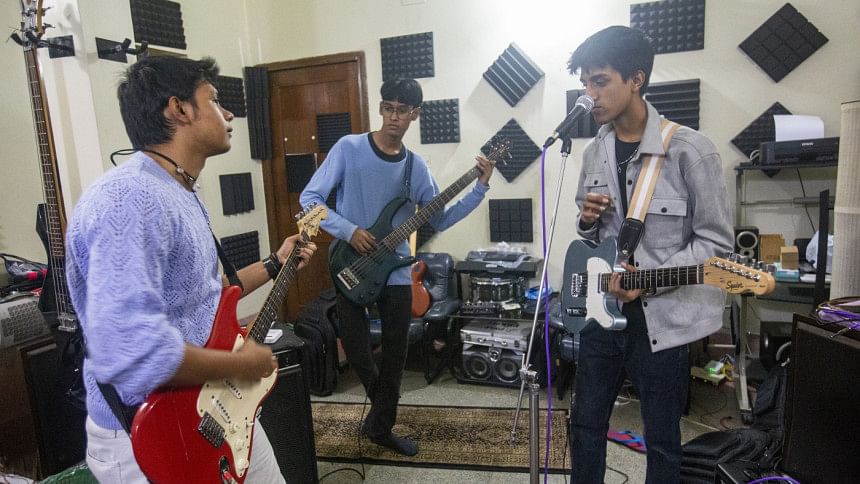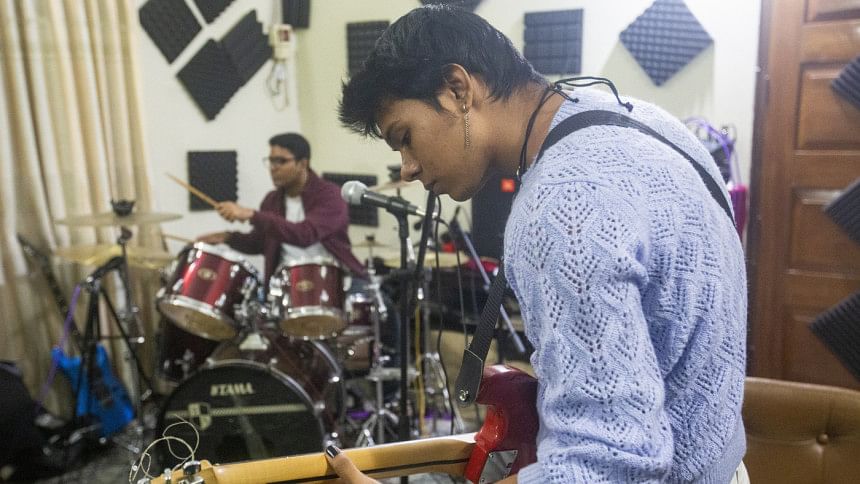Strike the right chord

"Music comes naturally to me. Even at my lowest, the stage feels like home and the adrenaline rush I get while performing beats any other joy I could possibly experience," says Ayaz Hamid, a high school senior who has been making music as a solo artist for the past two years.
Like Ayaz, thousands of young individuals around the country have been enthralled by their love for music. For many, music acts as a form of escapism from the daily hustle and bustle. For others, it's a mode of self-expression, achieved through creating music and by experiencing it together with a crowd.
As a young drummer in high school myself, I find comfort behind rusty, worn-out drum kits, covering songs from my favourite musicians. But despite my love for the art, I'll probably never be able to pursue music professionally.
However, for the budding artists who dream of making it on the big stage, music is more than just a past-time activity — it becomes a lifestyle that they readily adopt.
For Md. Ha-Mim Haider Bhuiyan, first-year student at Bangladesh University of Professionals (BUP) and drummer at Wireless More, music became an intrinsic part of his day-to-day life ever since he picked up drumming. But after juggling classes, tuitions, and part-time work throughout the week, committing to practice and recording sessions becomes a tiring endeavour.
"Since all of our band members are currently pursuing their undergrads, we can't always fix a date when we're all free to go out and play music together," says Ha-Mim.
Ha-Mim's predicament isn't unheard of in the music scene either. Moshud Monjur Barsho, a twelfth grader at St. Joseph Higher Secondary School, and guitarist and drummer at Autritio, knows how hard it is to rally the band members to come together and spend hours behind their passion project.
"Since all of our members hail from different institutions, picking a time when we're all free is complicated," said Barsho. "But the feeling of being able to connect with people through musical notes and beats alone is impeccable, and that keeps us going."
Facilities for practising in itself have increased significantly over time. There are now several practice pads across the country, especially in the capital city.
These practice pads and recording studios allow young musicians to rent out a studio area along with professional equipment, such as drum kits, amplifiers, speakers, sound mixing equipment, etc. They are also cost-effective for the most part, as four-hour-long bookings cost anywhere from BDT 700 BDT to BDT 1500. Split between four or five members, it's often within budget for young people.
However, an issue that still remains with most pads is the consistent lack of maintenance, so much so that shoddy cables, faulty speakers, and broken equipment have become normalised.
"There have been instances where we had to travel all the way from Mohammadpur to Moghbazar for a jamming session, only to discover that the equipment was busted," laments Ha-Mim.
Another important aspect that musicians have to worry about is financial sustainability. For bands and artists who are just starting out, the grim reality is that earning a decent amount of money to sustain the group is very challenging.
"When we were starting out, we only played a handful of small shows at schools and colleges for free," explains Barsho. "The band music scene is quite competitive now, so being invited to live shows and gigs is hard unless you have good connections across the scene and exposure on social media."

The lack of monetary gain is also a hindrance in artists' creative process, to some extent. Ha-Mim explained how revenue from performing live shows barely lasted even a month, since whatever they earned from shows went towards booking practice pads and producing their own music.
"The money we earn isn't enough to cover all the expenses that go behind practising, recording, producing, etc., so each of us need to pitch in from our own pockets," he said.
For solo musicians, it is a similarly stressful process, as opportunities for solo acts are few and far between.
"The indie scene in Dhaka has been vibrant, but open mics, gigs, and opportunities for artists to do live shows are very rare, even though these are practically our bread and butter," explained Ayaz.
"Without big labels or connections to back me up, I have to do freelance work to accumulate funds slowly, and that's the best I can do for now. I believe I speak for a lot of indie artists when I say this."
Apart from live shows, there is also potential revenue to be made from streaming services like Spotify and YouTube, but the output is seldom worthwhile. YouTube has a strict and overbearing monetisation framework, and Spotify's output isn't enough to make any ends meet. As a result, most artists rely on gigs while using streaming services to advertise those shows, almost like makeshift social media platforms.
To understand the ups and downs of the journey that young artists go through, I reached out to Sakib Manzur Zihan, guitarist of Arekta Rock Band. Having been in the music industry for a while, he shared his experiences, "We didn't start out with the hopes of getting famous or making money. We wanted to make music and share it with people, and that's a big driving force behind a lot of artists," he said.
"With so many great bands coming in, now is a great time to be doing music in Bangladesh. While it is a pretty steep slope to climb when you're just starting out, it's extremely gratifying in the end."
Throughout the ages, Bangladesh's music community has proven its foothold in the greater world. As we embark on a new wave of rising artists who look to make it in the local music scene, there is no doubt that this is only the tip of an iceberg that is here to stay.
Ayaan is obsessed with organising spreadsheets. Send him well-formatted emails with bullet points at [email protected]

 For all latest news, follow The Daily Star's Google News channel.
For all latest news, follow The Daily Star's Google News channel. 









Comments